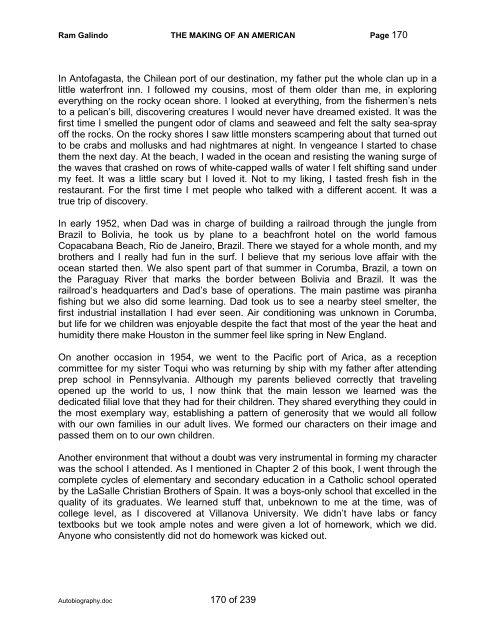Autobiography - The Galindo Group
Autobiography - The Galindo Group
Autobiography - The Galindo Group
You also want an ePaper? Increase the reach of your titles
YUMPU automatically turns print PDFs into web optimized ePapers that Google loves.
Ram <strong>Galindo</strong> THE MAKING OF AN AMERICAN Page 170<br />
In Antofagasta, the Chilean port of our destination, my father put the whole clan up in a<br />
little waterfront inn. I followed my cousins, most of them older than me, in exploring<br />
everything on the rocky ocean shore. I looked at everything, from the fishermen’s nets<br />
to a pelican’s bill, discovering creatures I would never have dreamed existed. It was the<br />
first time I smelled the pungent odor of clams and seaweed and felt the salty sea-spray<br />
off the rocks. On the rocky shores I saw little monsters scampering about that turned out<br />
to be crabs and mollusks and had nightmares at night. In vengeance I started to chase<br />
them the next day. At the beach, I waded in the ocean and resisting the waning surge of<br />
the waves that crashed on rows of white-capped walls of water I felt shifting sand under<br />
my feet. It was a little scary but I loved it. Not to my liking, I tasted fresh fish in the<br />
restaurant. For the first time I met people who talked with a different accent. It was a<br />
true trip of discovery.<br />
In early 1952, when Dad was in charge of building a railroad through the jungle from<br />
Brazil to Bolivia, he took us by plane to a beachfront hotel on the world famous<br />
Copacabana Beach, Rio de Janeiro, Brazil. <strong>The</strong>re we stayed for a whole month, and my<br />
brothers and I really had fun in the surf. I believe that my serious love affair with the<br />
ocean started then. We also spent part of that summer in Corumba, Brazil, a town on<br />
the Paraguay River that marks the border between Bolivia and Brazil. It was the<br />
railroad’s headquarters and Dad’s base of operations. <strong>The</strong> main pastime was piranha<br />
fishing but we also did some learning. Dad took us to see a nearby steel smelter, the<br />
first industrial installation I had ever seen. Air conditioning was unknown in Corumba,<br />
but life for we children was enjoyable despite the fact that most of the year the heat and<br />
humidity there make Houston in the summer feel like spring in New England.<br />
On another occasion in 1954, we went to the Pacific port of Arica, as a reception<br />
committee for my sister Toqui who was returning by ship with my father after attending<br />
prep school in Pennsylvania. Although my parents believed correctly that traveling<br />
opened up the world to us, I now think that the main lesson we learned was the<br />
dedicated filial love that they had for their children. <strong>The</strong>y shared everything they could in<br />
the most exemplary way, establishing a pattern of generosity that we would all follow<br />
with our own families in our adult lives. We formed our characters on their image and<br />
passed them on to our own children.<br />
Another environment that without a doubt was very instrumental in forming my character<br />
was the school I attended. As I mentioned in Chapter 2 of this book, I went through the<br />
complete cycles of elementary and secondary education in a Catholic school operated<br />
by the LaSalle Christian Brothers of Spain. It was a boys-only school that excelled in the<br />
quality of its graduates. We learned stuff that, unbeknown to me at the time, was of<br />
college level, as I discovered at Villanova University. We didn’t have labs or fancy<br />
textbooks but we took ample notes and were given a lot of homework, which we did.<br />
Anyone who consistently did not do homework was kicked out.<br />
<strong>Autobiography</strong>.doc 170 of 239


